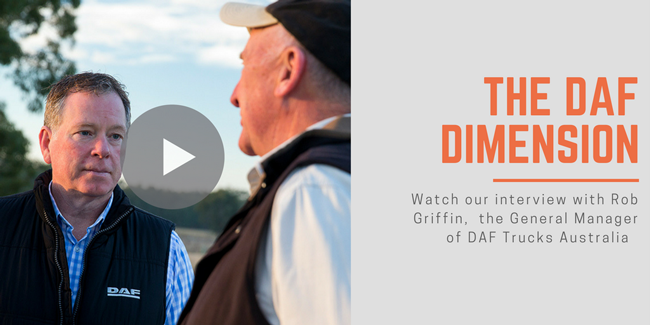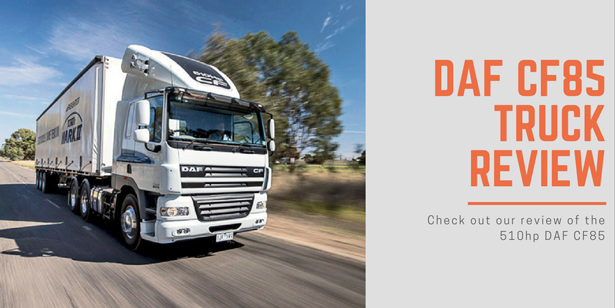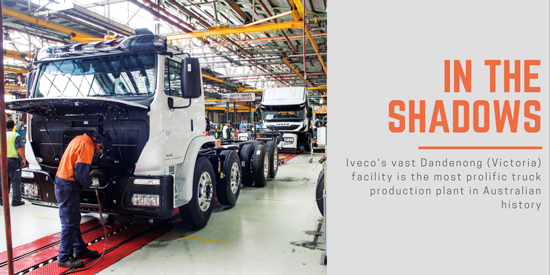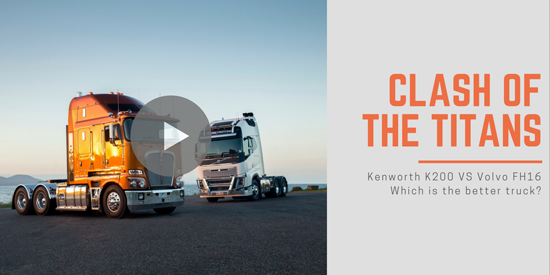Australian car manufacturing is dead and buried, but it’s a vastly different story in the truck business where major milestones by two industry giants highlight the enduring success of trucks made in Australia, for Australia. Not that the public would be even remotely aware of it given the blatant indifference of the mainstream media and its political purveyors. Steve Brooks presents this special report
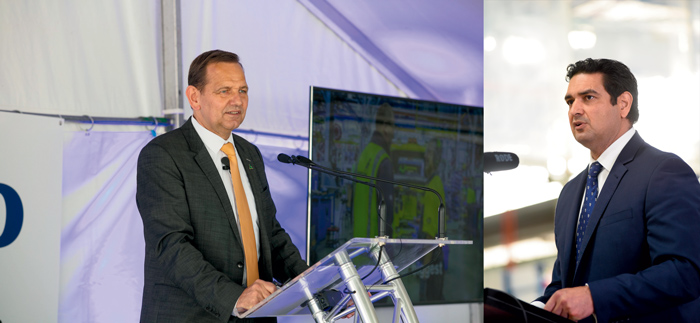 |
|
Volvo Group Australia boss Peter Voorhoeve (left) and Paccar Australia managing director Andrew Hadjikakou
|
They each control the executive keys and corporate expectations of the two most prominent and successful brands in Australia’s heavy truck business. They are also two of the most disparate, contrasting individuals you’re likely to find anywhere.
One, the carefully considered, gentle-mannered, quietly confident, and calmly deliberate son of proud immigrant parents who tolerates rather than seeks the occasional glare of the spotlight. The other, a perpetually upbeat, inherently animated, and unequivocally ambitious Dutchman with a natural flair for life in the limelight.
The former is Paccar Australia managing director Andrew Hadjikakou. Or, just ‘Hadge’ to those in the inner circle. The latter is Volvo Group Australia (VGA) president and chief executive officer Peter Voorhoeve. Or Peter V to just about everyone.
Different as they are, though, there’s much about their characters that reflect the equally contrasting images of the giant corporations they guide in this country.
Like, here and abroad, Paccar is not an outfit to normally seek the public gaze and, except for events such as the unveiling of a new model or a particularly prominent milestone, rarely resorts to bold bursts of corporate expression. Hadge, likewise!
On the other hand, Volvo, over the past five or six years, has enacted a hugely effective and extremely clever global marketing campaign designed to displace its staid, conservative image with that of a dynamic, resourceful innovator. Enter Peter V!
The differences, however, go way beyond character. For instance, unless there’s something secretly stirring in Paccar’s executive cauldron, the likelihood is that Hadjikakou will continue the trend of most of his long-serving predecessors and remain at the helm of Paccar Australia for many years. Decades maybe, further cementing the strong and consistent management policies that many cite as a major factor in Paccar’s enduring success.
Not so Voorhoeve. As corporate policy dictates, he will be ultimately called to a high-ranking posting somewhere in the vast Volvo world, his executive status no doubt buoyed by VGA’s powerful performance during his tenure in one of the world’s most demanding and competitive markets. For the record, he has already been here five years, much longer than most of his predecessors, and VGA insiders suggest he probably has another two years to run before he’s called elsewhere. Whatever, between now and then, you can bet his large clog will remain firmly planted on full throttle.
Despite all the differences, Paccar Australia and VGA also share a number of indisputable attributes. First, they are both hugely successful, with no imminent challengers to their respective heights on the heavy-duty leader board. Other than each other, of course.
For its part, VGA is on a roll, big time, more successful than ever with its Volvo, Mack and UD brands combining to comfortably entrench the group as the biggest supplier of heavy-duty trucks to the Australian market.
At number two, obviously enough, are Paccar’s Kenworth and DAF brands. Still, in the battle for individual market leadership, Kenworth continues to reign supreme and, while Volvo may secretly aspire to the title, the likelihood is negligible. At best!
But by far the most significant of the few threads that give these converse corporates some semblance of similarity is the absolute belief that building trucks in Australia, for Australia, is the foundation for such dominant success. And, more to the point, each asserts total determination to keeping it that way.
Important Milestones
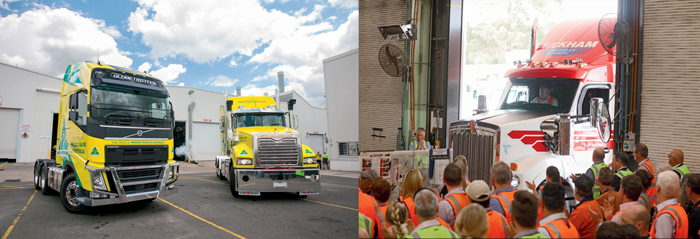 |
|
Ironically, both Volvo and Kenworth delivered their 60,000th Australian-built trucks within weeks of each other.
|
Paccar has been building Kenworths at its Bayswater plant in Melbourne’s east since 1971 while, up north, Volvo’s Wacol factory in Brisbane’s western suburbs first started putting trucks together just a year later.
Then, in 2002, Mack was added to Wacol’s production volume and, from that point on, periodic Swedish concerns about the economic viability of the Australian factory appear to have fallen completely off the corporate radar. Or, maybe they’re simply not as pronounced as they once were. Whatever, there’s no question Mack added vital wampum to Wacol’s worth.
Paccar, too, has known its share of tough times and, relying on Kenworth alone, there’s little doubt Bayswater’s viability has occasionally stood stark in the Seattle (Paccar HQ) spotlight. Nonetheless, the engineering and manufacturing capabilities at Bayswater have continued to evolve, expanding to the point where it is widely regarded, both inside and outside the Paccar realm, as a world-class facility for the production of high-quality trucks in a demanding, diverse and relatively low-volume market.
What’s more, just as Mack production added immensely to the viability of Volvo’s Wacol facility, the assembly of DAF models at Bayswater starting around August this year is sure to not only enhance the Dutch truck’s appeal for Australian conditions but, to a large extent, complement the factory’s long-term value.
Moreover, as Hadjikakou and Voorhoeve would separately allude within a fortnight of each other late last year, the keys to success and ultimately survival as a local producer are viability and volume. Intertwined and inseparable, one begets the other.
Even so, as the market strength of both Paccar and VGA blatantly attest, neither viability nor volume are achievable without the engineering capability to produce and tailor trucks acceptable to a heavy-duty market that demands much and has little mind for mediocrity.
Similarly, the two leaders would, in due course, acknowledge the great debt owed to those visionary individuals who, almost half a century earlier, recognised the unique character and conditions of Australian road transport, vouching for investment in local production rather than simply importing fully built-up trucks from a distant parent.
It was a fact given genuine regard towards the close of 2017 as VGA and then Paccar celebrated the 60,000th Australian-built truck to roll off their respective lines. Coincidentally perhaps, both outfits notched the milestone within a few weeks of each other.
Sure, they marked the occasion in decidedly different fashion, but the message was common and concise. First, it was a spirited Voorhoeve who succinctly stated: “Australia is a most demanding transport environment [and] a different set of trucks needs to be made here.” Demanding and different indeed, verified in Volvo’s case by Australia’s place as a critical test bed for group components from around the globe.
“We need to be here,” he continued in front of a sizeable collection of industry dignitaries and trade media while, in the background, the pulse of production didn’t miss a beat.
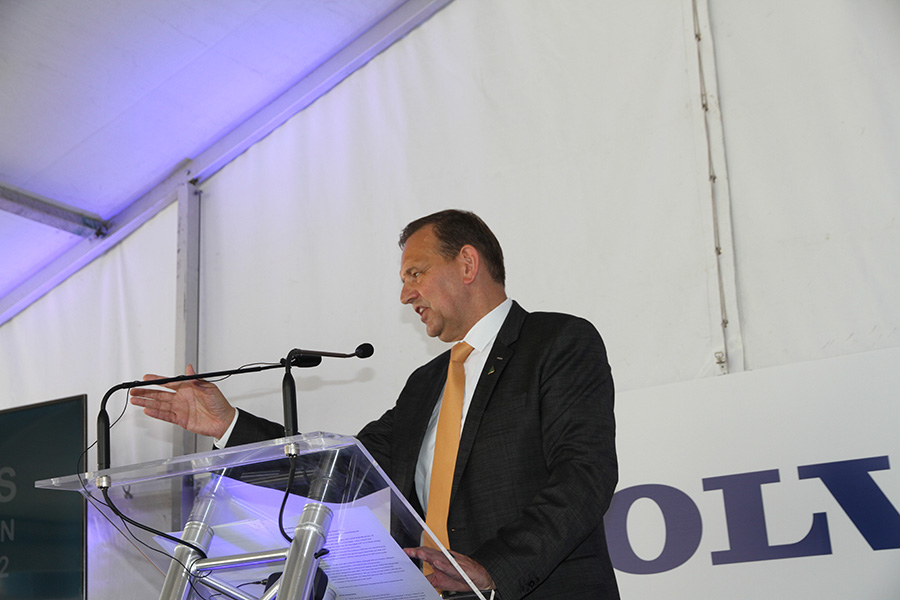 |
|
Firm believer. “Australia is a most demanding transport environment … We need to be here,” an exuberant Peter Voorhoeve says
|
Notable by their absence, however, were the politicians and mainstream news outlets invited to the event but obviously uninterested in the celebration of an Australian success story. Typical!
Never mind, an exuberant Voorhoeve had a good story to tell and wasn’t about to allow ignorance and indifference dampen the milestone or the message. The simple fact, he emphasised, is that, “Our trucks work harder than anywhere else in the world [and] building trucks locally means we can meet and exceed the demands of customers in this competitive market.”
As he was quick to add, though, with 1500 employees on VGA’s books, close to 450 in the factory alone, and thousands more directly and indirectly engaged by dealers and the group’s 85 supplier companies, “this is a people business. The livelihoods of many, many families and the social and economic benefits that flow from that are directly related to the fact that we build trucks here.”
Maintaining the momentum, “This plant makes a significant economic contribution to the local area, and it does it without any government subsidies,” he added in a press statement. It was a point that didn’t miss the mark, aimed squarely at a car manufacturing industry which has spectacularly failed despite decades of inordinate government assistance.
On the other hand, both Paccar and VGA have continued to succeed, continued to employ, and continued to invest in, local production regardless of strong competition from fully imported products, repeated rejections for even mild levels of government subsidy, and, for the most part, abject indifference by politicians and their media mouthpieces.
Still, as a determined Voorhoeve continued, “We are committed to manufacturing trucks in Australia and have invested over $27 million in the production facility alone in the last six years, and will invest a further $3.7 million in upgrading our chassis treatment and cab paint processes.
“We’re talking about a lot of money, which is a reflection of how confident we are in local manufacturing.” He further explained that, between the Volvo Group and its private partners, approximately $160 million will have been invested in the dealership and service network between 2014 and 2018.
As for that 60,000th truck, it was, logically enough, a Volvo. An FH Globetrotter to be exact, alongside truck number 60,001, a Mack Super-Liner. According to VGA, about 44,000 Volvos and 16,000 Macks have rolled out of Wacol and, for one special guest speaker, the pride and satisfaction were almost certainly greater than any.
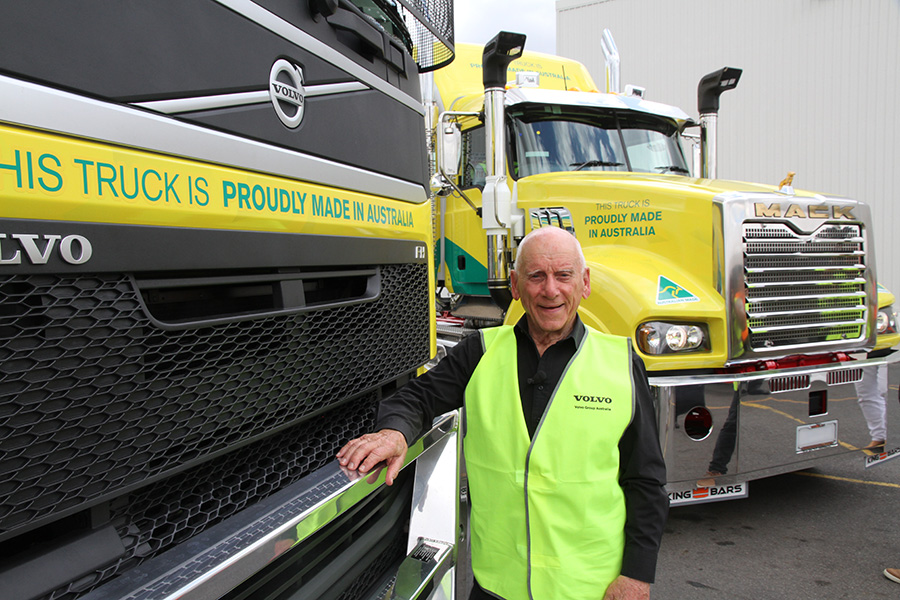 |
|
Patriarch. The venerable Max Winkless was a driving force in the creation of Volvo’s Wacol (Qld) factory. Before that, he also had a big hand in Mack’s early history in Australia
|
Typically sharp and incredibly sprightly for his 90 years, Max Winkless is the revered patriarch of Volvo in Australia, and it’s no exaggeration to cite this remarkable gentleman with the quick wit and even quicker smile as the driving force in Volvo’s entry to the Australian market. More to the point, from the first plans in 1968, Max was convinced the Swedish trucks should at least be assembled here, and was subsequently instrumental in securing a former British car plant in Wacol as the production base.
The rest is history, except that, before Volvo, the enterprising Winkless also played a major part in Mack’s early history in this country, and the irony of the two brands now being produced together under the same roof obviously wasn’t lost on him. “Funny the way things work out, Steve, eh!” Sure is, Max.
Yet the day wasn’t done, with Voorhoeve announcing that VGA is now officially part of the ‘Australian Made’ campaign. Not that anyone would’ve doubted it given the iconic stickers and green and gold livery of both trucks, each initially headed for promotional duties before being sold.
As VGA stated in a press release, the group is “currently the only truck manufacturer in Australia to have been awarded the prestigious certification”. That, however, was something of a moot statement given that VGA is certainly not the only truck maker in the country – yet apparently the only one to formally adopt and perhaps seek ‘Australian Made’ certification.
On the other hand, Paccar proudly promotes its home-grown credentials with a phrase all its own: ‘Australian Made. World’s Best’.
Anyway, it seemed more than fitting that VGA should end the day with Men At Work’s classic ‘Down Under’ filling the air. Meanwhile, a few weeks later in another factory in another state, celebrations were sung to a somewhat different tune.
From the Top
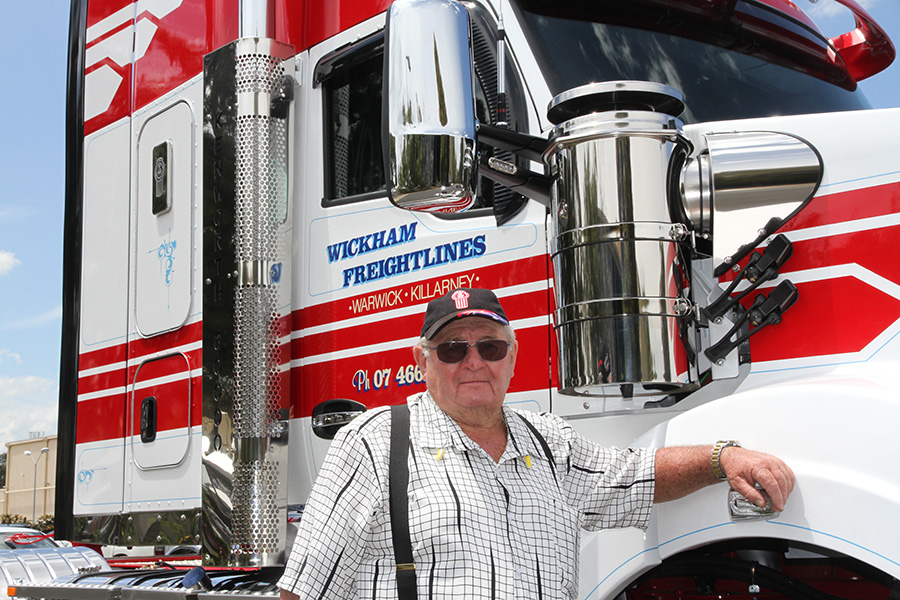 |
|
Peter Wickham with the 60,000th Kenworth to roll off the Bayswater production line. It’s also the 250th Kenworth bought by Wickham Freightlines
|
I could be wrong, but I’ll wager a sizeable slab of money that, as a singer-songwriter, you won’t hear Peter Wickham’s name called anytime soon at a music industry award’s night. That said, I’ll wager even more that the many hundreds of Kenworth factory workers, office staff, managers, senior executives, and smattering of invited guests will never forget the day Peter unpacked his guitar and sang the story of Wickham Freightlines and its 40-year relationship with Kenworth.
The story goes that he wrote the song in secret, keeping it from everyone, including his family. Word also has it there were a few nerves at what might ensue.
It was, however, an exceptionally passionate performance riddled with humour and emotion about tough early days with his late brother Angus, the extraordinary part played by Kenworth and the Brown & Hurley dealership in the company’s evolution, and Wickham’s gratitude for the effort and dedication of the people who design and build their trucks.
In every sense a rare moment, the retired co-founder of one of the most recognised and well-regarded privately owned transport companies in Australia, proudly and humbly accepted a long and heartfelt ovation from his audience.
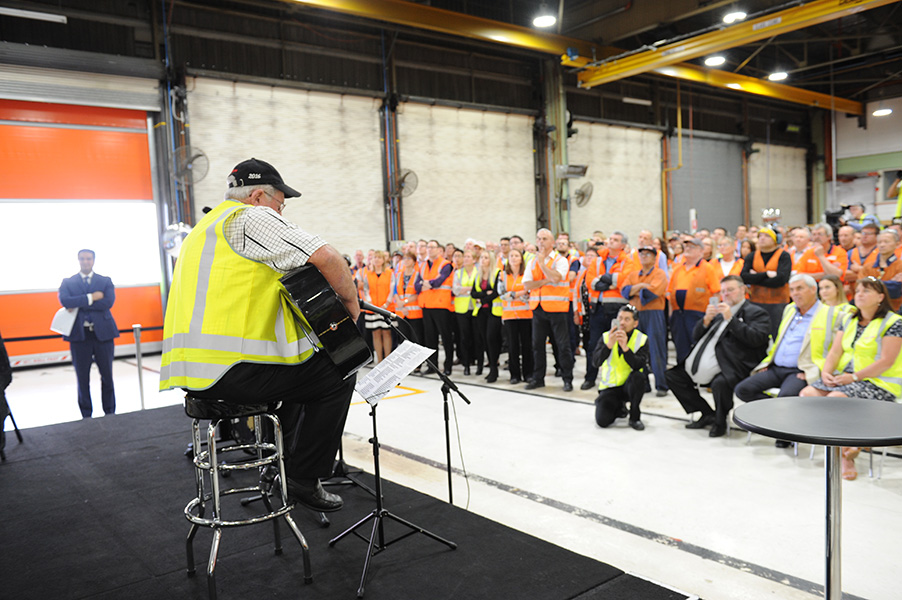 |
|
Peter Wickham with the 60,000th Kenworth to roll off the Bayswater production line. It’s also the 250th Kenworth bought by Wickham Freightlines
|
Yet applause wasn’t the only thing Peter Wickham received that day. He was also handed the keys to a new T610 SAR, the 60,000th Kenworth to roll off the Bayswater line, and the 250th to join the Wickham operation since the first Kenworth arrived in 1978. Handing the keys over was Hadjikakou, saying simply: “Celebrating key production milestones is a Kenworth tradition, one that began in April 1974, when we handed over the keys to truck number 1000.”
Typically, perhaps, Hadjikakou was content to leave much of the official commentary to others, not least Bayswater production manager Gavin Cleary, Brown & Hurley joint managing director Kevin Hurley and, critically, Wickham Freightlines chief executive Darren Eather – who made no secret of Wickham’s entrenched preference for “buying Australian-made”.
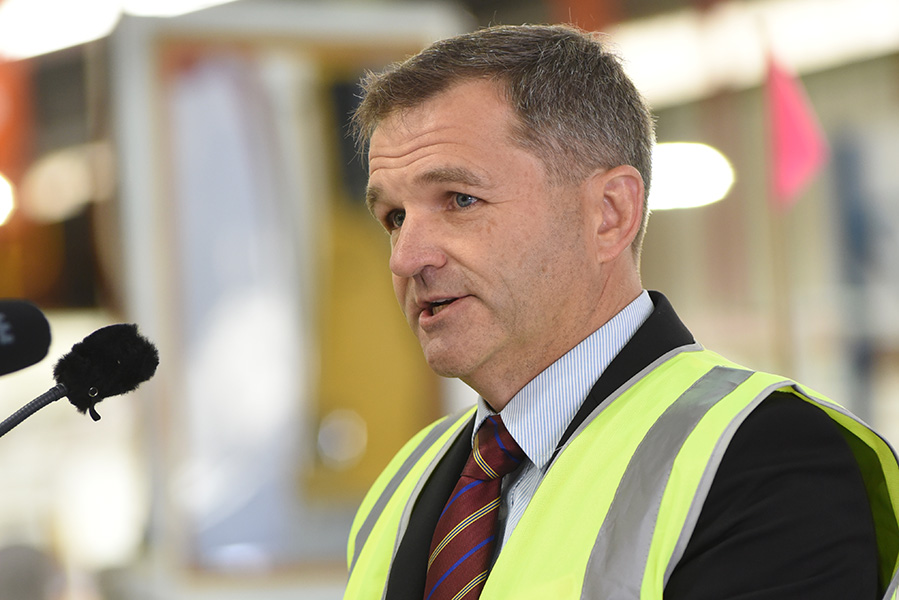 |
|
Wickham Freightlines chief executive Darren Eather made no secret of an entrenched preference for “buying Australian-made”
|
A few hours later, in the quiet confines of Paccar Australia’s boardroom, his celebratory duties done and production back in full swing, there was not a second of doubt that ‘buying Australian’ would also dominate a candid one-on-one discussion with Hadjikakou. Ten years with Paccar, the last three as managing director, he admits a strong sense of satisfaction that the 60,000th Kenworth was notched on his watch.
“I am proud, definitely,” he conceded before quickly adding that the real achievement belonged to others. “It’s good that I can follow in the footsteps of those who achieved so much before me, but, most of all, I’m pleased for our employees.
“It’s a wonderful achievement for them, our dealers and our many suppliers. It takes a lot of people over a lot of years to make events like this possible.
“We have a world-class facility here and that becomes particularly apparent at milestones such as this. It’s a good story from top to toe,” he continued. “The founders of Bayswater showed tremendous foresight when they decided, almost 47 years ago, to build trucks here.
“They really got it right and I think it’s just a great story that we’re viable, have been every year that we’ve been here, and that our parent continues to support and invest in our local production.”
Even more to the point: “The application, engineering and manufacturing that happen at this facility are the core of who we are and what we do – building trucks exactly to customer specs.
“It’s what customers expect from us and we get feedback constantly, and we listen to it,” he said earnestly. “Our customers have a big input on how the trucks look, how they drive, and certainly how they survive. These are trucks made for our conditions. Nowhere else, other than New Zealand and PNG, of course.”
So, would Kenworth be number one in the heavy-duty market without local production at Bayswater? The question drew a thoughtful yet somewhat staggered response: “It’s hard to say, but it’d certainly be a much tougher achievement.
“We are Australian designed and built, and immensely proud of what we do. Our priority is to make sure we’re doing things better, quicker and more efficient than all our competitors. These are the things that drive us and that won’t change.”
A similarly decisive Hadjikakou responded when asked if local production actually makes a Kenworth more expensive than a fully imported unit.
“For the most part, it comes down to economies of scale. No matter how many trucks we build for our market, it’s small compared to what European and US factories build, so the economies of scale aren’t necessarily replicated here in Australia, and that’s what adds to the expense of the vehicle.
“There are many ways we negate that, such as building in high levels of quality and working to a principle that constantly searches for ways to improve, to reduce waste and costs at every level. Not just in the factory, either. It’s throughout the entire operation.”
In Paccar parlance, it’s a principle known as ‘Six Sigma’ and, as Hadjikakou emphasised: “It is a standard within the worldwide Paccar network and we are totally committed to it. It’s what keeps us competitive.”
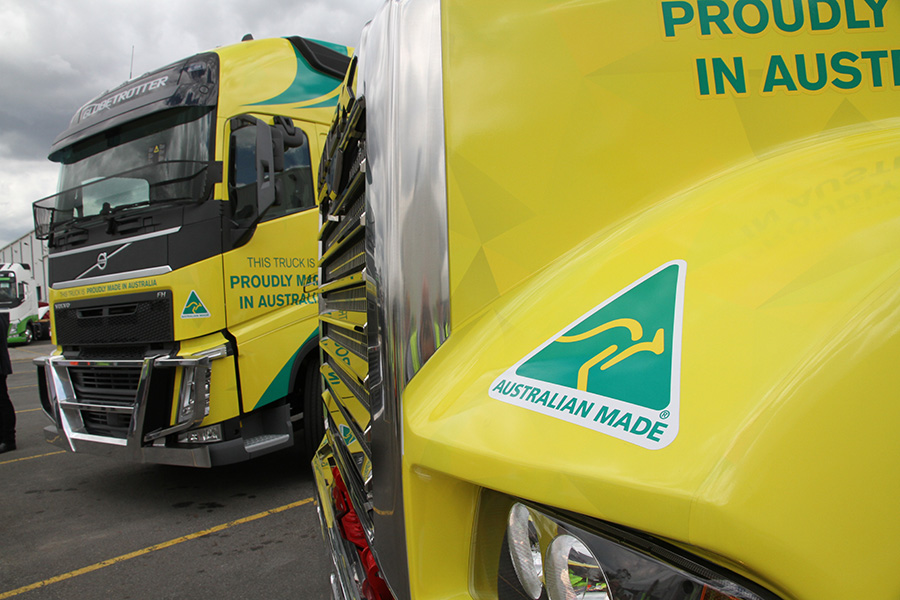 |
|
Iconic symbol. Volvo and Mack now officially ‘Australian Made’
|
However, will cost containment eventually force a rationalisation of the Kenworth range? It was a question which drew an immediate and adamant response.
“Absolutely not,” he said with blunt certainty. “Australia needs specific trucks to meet specific applications, unlike anywhere else in the world. We need to be able to fit niches and that’s where we achieve our greatest leverage. If anything, the model range will expand.”
Predictably, details on products under development were kept close to the chest, but he at least conceded that local engineering and assembly will lead to expanded DAF offerings.
As for broader use of the 2.1m-wide cab on Kenworth’s new T610, Hadjikakou admitted: “We obviously have aspirations to eventually use the cab across the whole [conventional] range.”
That, of course, means the T9 and T3 models, and vitally, an upcoming T410 series. “Believe me, we’re busy,” he said with a broad grin.
Still, it’s an entirely serious Hadjikakou who concedes that remaining competitive is the greatest challenge in a world almost unrecognisable to that which saw Kenworth’s first Australian-built truck in 1971.
“In today’s world, it’s unlikely a factory of Bayswater’s standard could be built from scratch for a market such as ours, around 10,000 or 12,000 heavy-duty trucks a year,” Hadjikakou commented. “If a new truck factory was on the cards anywhere, I’d suggest it would be where populations are greatest.
“That said, Australia has a unique and ingenious road transport industry with some of the most-advanced and efficient combinations in the world and, in a purely product context, that’s where Kenworth really makes its mark.”
Changing tack, however, it’s a definite Hadjikakou who cites factors with the potential to seriously threaten local truck production in the longer term.
“We must always remain competitive and that means staying focussed on costs and technology, and thinking more broadly in terms of the total road transport industry, particularly relating to drivers, training and attracting people into road transport,” he remarked. “On the technology side, if we don’t pay attention to what’s happening now, any company could go the way of the dodo.
“Not keeping up with technology, that’s the real threat. We need to make sure we’re relevant and providing products the customers and the industry require.
“Things will certainly be different in 20 or 30 years’ time but we have to have our eyes on it right now, particularly with developments in hybrids and electrification. There’s a lot going on and the world is changing, quickly!
“You can be sure that inside Paccar, the future is very much in focus,” he confirmed.
Bayswater and Beyond
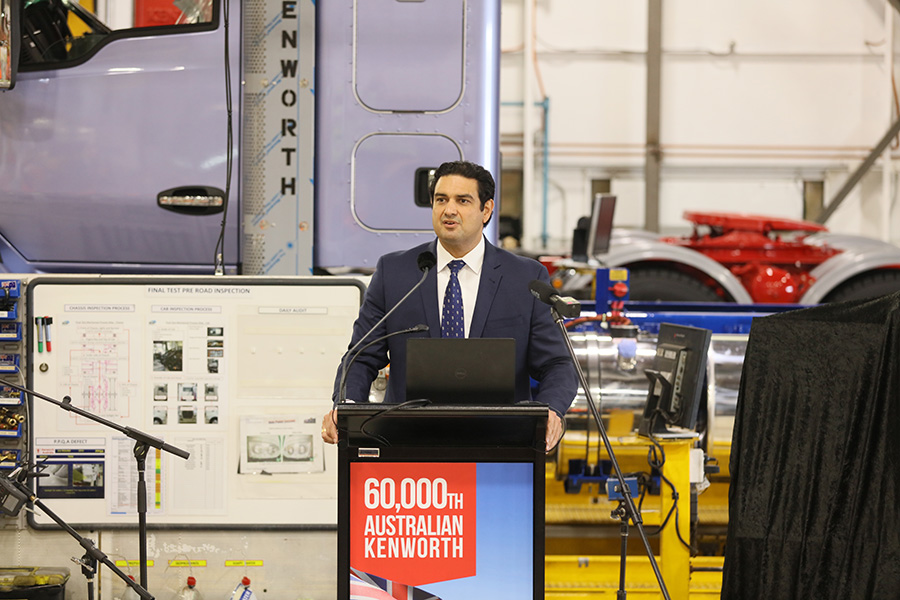 |
|
Andrew Hadjikakou: “We have a world-class facility here … it’s a good story from top to toe.”
|
As for any collegiate affinity with VGA as an Australian producer of trucks, a smiling and undeniably competitive ‘Hadge’ obviously preferred to keep the suggestion at arm’s length and simply push Paccar’s case. There are, he explains, about 160 local suppliers to Kenworth production delivering more than 7500 components, meaning up to 60 per cent of every Australian-built Kenworth consists of parts sourced locally.
“Certainly, it’s good for the Australian economy that for every employee we have in our operation, there are five to seven more in our supplier network and up to five in the dealer network and third-party companies,” Hadjikakou commented. “Right now there are around 1000 people on our payroll, so there would be 5000 to 7000 in the supply chain and another 4000 to 5000 in the dealer network and related companies. The flow-on effect from Bayswater is huge, no question.”
Fine, but given all the media coverage and political grandstanding about the loss of Australian car making, surely the lack of recognition for local truck production gets under his skin? An answer came with a shrewd smile: “It doesn’t annoy me. Never has. We’re not into being a prominent discussion point for the general media. That’s not who we are.
“Besides, our customers, our partners and our trucks do the talking for us.”
Fair enough, but Paccar has often made the point about succeeding without government subsidies. Surely, some form of assistance would be welcome?
“We’ve applied for assistance from time to time, for investment in our plant with various types of new technology, but we haven’t had much success. None actually,” he explained. A few seconds pass. “Our build rates have consistently increased and we’ve created quite a few new jobs in our local economy, so training subsidies for those sorts of things would be useful.
“But just because we don’t get a subsidy, that doesn’t stop us from doing the things we need and want to do. It never has and never will, and it certainly isn’t the key to success or survival.
“Yes, it’s disappointing at times, but it doesn’t keep me up at night. There are many other things much higher on our priorities,” Hadjikakou said succinctly.
On the positive side, though, the demise of car making has had a beneficial spin-off for Paccar.
“Our new T610 is a good example,” he explained. “There are a number of suppliers who were displaced by the end of car making and are now supplying to us. For example, there’s a Melbourne company which formerly supplied Toyota but is now supplying the T610 dashboard.
“That company came to us with a submission, we accepted it, and we’ve since sought others who have given us great new technology which would have otherwise been discarded with the demise of car making.
“We’re also attracting a lot of the car industry’s former employees with considerable skills we can put to good use. It’s good for them and good for us.”
Quiet for a moment, a pensive Hadjikakou concluded: “We take nothing for granted and there’s not a day goes by that we’re not looking for ways to improve. Success takes a lot of effort and a lot of thought by a lot of people.
“When we say ‘Australian Made. World’s Best’, we mean it. Absolutely!”


